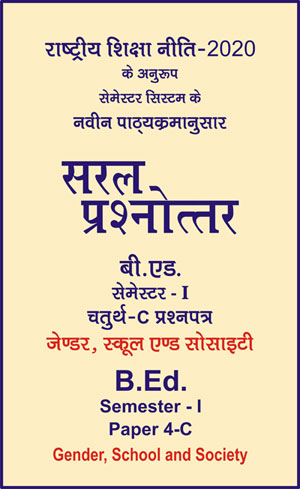|
बी एड - एम एड >> बी.एड. सेमेस्टर-1 प्रश्नपत्र-IV-C - जेण्डर, स्कूल एण्ड सोसाइटी बी.एड. सेमेस्टर-1 प्रश्नपत्र-IV-C - जेण्डर, स्कूल एण्ड सोसाइटीसरल प्रश्नोत्तर समूह
|
5 पाठक हैं |
||||||
बी.एड. सेमेस्टर-1 प्रश्नपत्र-IV-C - जेण्डर, स्कूल एण्ड सोसाइटी (अंग्रेजी भाषाा में)
Objective Type Questions
Note : Select the correct option.
-
………… is the process through which children make the accepted patterns of their society a part of their personality.
(a) Socialization
(b) Economicalism
(c) Emotionalism
(d) Processionalism -
With whom is any child born?
(a) customs
(b) practices
(c) physical abilities
(d) culture -
Due to whose contact a person becomes a social animal :
(a) society
(b) family
(c) friends
(d) all of these -
“The socialization of the child takes place best in a group of children and the child is the best teacher of other children.” This definition is given by :
(a) Bogards
(b) Greene
(c) Ross
(d) Roussack -
Culture affects the child's ...........
(a) behaviour
(b) mind
(c) body
(d) food -
What teachers should understand first for the character formation of children, the child's :
(a) interests
(b) attitudes
(c) both of the above
(d) none of the two -
From the point of view of socialization, healthy ............ relationships are very important.
(a) personal
(b) human
(c) political
(d) emotional -
With whom should the teacher develop healthy human relations?
(a) student
(b) headmaster
(c) other teachers
(d) with all of these -
In socialization, .............. also has a very important role.
(a) Competition
(b) Interest
(c) Habit
(d) Jealousy -
By being brought up in a proper environment, the child learns :
(a) ideals of the society
(b) behaviour in accordance with the values
(c) harmonizing
(d) all of the above -
The fundamental element of socialization is :
(a) behaviour
(b) thinking
(c) imitation
(d) politics -
A basic institution is :
(a) family
(b) school
(c) friend-circle
(d) relatives -
There is only a family, which provides the child :
(a) affection
(b) protection
(c) socialization
(d) all of these -
Every child is influenced by the culture of his .............
(a) family
(b) society
(c) school
(d) friends -
Socialization of the child affects :
(a) economic background
(b) upbringing
(c) neglect and pressure
(d) all of the above -
In which stage, the socialization of children takes place very fast :
(a) infancy
(b) adolescence
(c) both of the above
(d) none of these -
Through whom the things learned take permanent form :
(a) family
(b) school
(c) peer group
(d) all of these -
Forms the norms of behaviour of the child :
(a) family
(b) school
(c) peer group
(d) neighbourhood -
Reinforce the values, ideals and norms acquired by the family :
(a) school
(b) behaviour
(c) society
(d) friends -
What a child learns in friend groups and play groups :
(a) healthy competition
(b) healthy conflict
(c) emotional control and discipline
(d) all of the above -
For working towards gender equality in the classroom which strategy is correct ?
(a) Inclusive language
(b) Exclusive practices
(c) Unequal tasks
(d) Away from fam. -
Which of the following behaviour is normally learned during the process of socialization ?
(a) The roles we have to play in life
(b) Cultural norms
(c) The surrounding language
(d) All of the above -
Which one is the formal agency of socialization ?
(a) Family
(b) School
(c) Peer
(d) Neighbourhood
|
|||||













